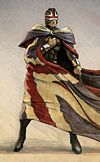Difference between revisions of "Dawn Patrol"
(Hero One not Hero 1) |
m (Hero One not Hero 1) |
||
| Line 1: | Line 1: | ||
| − | [[File: | + | [[File:Hero_1.jpg|thumb|100px|Hero One]] |
== Overview == | == Overview == | ||
Revision as of 13:51, 29 December 2010
Overview
The Dawn Patrol is a British supergroup equivalent of the American Freedom Phalanx.
Contents
History
In 1923 a group of former British fighter pilots met together at the ancestral home of Alistair Sutton to form a sacred trust. Bound together by the horrors they'd all seen together during the Great War they decided that they must do all they could to prevent such atrocities from ever happening again. They devoted themselves to the cause of peace and justice in the world, no matter what the personal cost. These were not men with super powers or special technology but simply brave soldiers willing to do whatever it took, to give whatever they had.
They spent their family fortunes on experimental technology, explorations to distant lands and the building of a secret headquarters. They learned the most deadly and esoteric martial arts, became lethally adept with all manner of weaponry. They fought fascist warlords in Asia and anarchist terrorists in Europe. They chased down madmen bent on destroying or ruling the world. They clashed again and again with some of the world's first and most deadly super villains. Greatest of all however was Nemesis, the Prussian Prince of Automatons whose mad genius and devious creations caused the Dawn Patrol and the world no end of trouble.
Throughout the 20's and 30's the Dawn Patrol fought evil wherever they found it until they were blindsided by an evil even they couldn't imagine. Sutton and his fellow heroes, for all their bravery, could not stomach the idea of another great war in Europe. Thus they unintentionally turned a blind eye to the evil taking seed in Nazi Germany. They, like Prime Minister Chamberlain, wanted to assure Peace in their Time and utterly failed to take any action against fascism. When war finally came, of course, they changed their minds and leaped to their nation's defense.
At the onset of the 2nd World War, Great Britain held on by its fingernails, protected from German invasion by its air force, dwindling navy and dedicated but small bands of heroes such as the Dawn Patrol.
The Dawn Patrol, having originally opposed war with Germany, was still reeling from the public relations backlash that came with the war's outbreak. They fought bravely alongside the RAF during the Battle of Britain and escorted Royal Navy and American convoys across the Atlantic, taking terrible losses in the process. However, they found their greatest challenge in fighting off the Storm Korps, Germany's elite super soldier cadre. After the fall of France, The Storm Korps began a prolonged series of raids into the British Isles. Their super powers allowed them to cause tremendous damage, much more than normal Special Forces operations could ever hope to accomplish.
The most daring Storm Korps raid came within a hair's breadth of striking a tremendous blow against British morale. Three Storm Korps super soldiers, led by the nefarious Eisensturm, managed to breach Buckingham Palace's defenses and kidnap his royal highness the King of England. Alistair Sutton, leader of the Dawn Patrol, chased the kidnappers down and fought Eisensturm to a standstill in the Scottish Highlands. He bought enough time for the rest of the Dawn Patrol to arrive and help rescue the captured monarch from the hands of fascist villainy. It was shortly after this that American victories in Africa drew off much of the Storm Korps' resources and many credit Sutton's victory over Eisensturm as the turning point of the war for Great Britain and the Dawn Patrol.
On D-Day, the Freedom Phalanx and Dawn Patrol were part of the first wave to enter France.
In 1953 the Dawn Patrol joined the ranks of the Freedom Phalanx and the mysterious Midnight Squad in taking advantage of the 1952 expansion of the Citizen Crime Fighting Act, to include officially licensed hero organizations that could in turn deputize their members.
In 1976 when the world nearly stepped over the brink into total nuclear annihilation. The Dawn Patrol and Freedom Phalanx organized a group of two-dozen international heroes to neutralize American and Soviet missiles before either could fully deploy, and sent the world a message: they would not tolerate such behavior. Hero One (Great Britain’s foremost hero and predecessor to the Vanguard’s Hero 1) stepped into the limelight to negotiate a peaceful solution to the crisis.
In the late 1970s, the Dawn Patrol teamed up with the Regulators to stop the flow of drugs at their sources. They launched a series of controversial attacks in South America and Central Asia, burning coca and poppy fields to the ground. These assaults, while popular in the US, were not very well received abroad, with over a dozen nations forbidding members of both hero organizations from ever setting foot or flying over their sovereign territory again.
During the Rikti invasion the Dawn Patrol, along with all other hero organizations, suffered heavy casualties, including the loss of Hero One.
After the Rikti invasion, the Patrol has shifted, at least partially, their efforts on the Lost. Working heavily with a social worker named Shannon Price, many of the Dawn Patrol attempted to get to the bottom of "The Lost" virus. This has claimed the life of at least one of its members, Quint "The Fist" Velasquez.
Currently, the leader of the Dawn Patrol is Lady Jane, who assumed the mantle of leadership after the first Rikti War.
Members
- Original Luminary - Kit Rafter
- Alistair Sutton (Former leader, Founding Member, presumed dead)
- Hero One
- Hero 1 (former leader?)
- Quint "The Fist" Velasquez (deceased)
- Lady Jane (current leader)
- Geoffery Cartwright (Founding Member)
